- "As academic medicine begins to recognize and examine racism as the root cause of racially disparate health outcomes, we need curricula for training physicians to dismantle the systems that perpetuate these inequities."
Racial Affinity Group Caucases
As academic medicine starts to acknowledge and examine racism as the root cause of racially disparate health outcomes, there is a need for curricula that trains physicians to dismantle systems perpetuating these inequities. Traditional medical education approaches are often founded in inequitable systems, making new methods essential. Racial affinity group caucuses (RAGCs) offer one such approach. RAGCs involve facilitated sessions where participants are grouped according to self-identified racial or ethnic identity to help integrate antiracism curricula into clinical practice. As part of a broader antiracism and anti-oppression curriculum, RAGCs engage participants in critical introspection, build community, and encourage praxis, the integration of theory, self-reflection, and action.
Structural Racism
Traditional medical education has been centered on White learners and perpetuates structural racism. Pedagogical approaches tend to focus on White learners while ignoring the differential impact of content on BIPOC (Black, Indigenous, or people of color) learners. Immersion in the existing medical education system can be retraumatizing, causing imposter syndrome, heightened anxiety, and a reduced sense of belonging. As efforts are made to recruit more medical students who are BIPOC, recognizing this harm and promoting pedagogical approaches that support BIPOC learners' needs is crucial.
What the Research Shows
RAGCs have been studied in various settings, but not extensively in medical education. These caucuses provide BIPOC participants with a space to heal from racial trauma, bring their whole selves, and identify strategies for addressing structural racism. Implementing RAGCs in medical education has shown positive results, with BIPOC trainees expressing a full range of emotions and developing their antiracism praxis.
Beneficial for All
RAGCs for Black learners offer an environment that centers Black experiences and celebrates diverse Black perspectives. This environment helps participants explore their experiences of racism and understand antiracism without the burden of educating non-Black colleagues or facing denial, gaslighting, and White fragility. RAGCs for people of color similarly provide opportunities for community building, understanding, and healing from racism. White trainees also benefit from facilitated discussions where they can consider and challenge frameworks for dismantling misconceptions about race and racism. RAGCs support learners in building critical consciousness and applying content from their antiracism curriculum. This approach tailors areas of focus for each identity group, supplementing education received in racially integrated spaces and enabling participants to progress more effectively through subsequent stages of learning.
Future Solutions
Further study of racial affinity groups in medical education is needed to better understand their value in conjunction with antiracism curricula. Successful implementation of RAGCs requires explicit support from program leadership, involvement of leadership and learners in the planning process, and facilitators with advanced skills to guide participants through these emotionally charged discussions. Addressing racism in medicine necessitates systemic, interpersonal, and individual approaches. RAGCs are designed to support learning, growth, and reflection while centering BIPOC learners and providing differentiation for all learners. Incorporating longitudinal RAGCs throughout medical school and residency programs offers an opportunity for learners to contextualize antiracism curricula, build supportive communities, and expand knowledge and skill in antiracist doctoring. RAGCs are a promising approach to equipping physicians to help eliminate health inequities.
Lewis, L., Cribb Fabersunne, C., Iacopetti, C. L., Negussie-Retta, G., McBride, D., Irving, P., & Marbin, J. (2023). Racial affinity group caucusing in medical education — A key supplement to antiracism curricula. New England Journal of Medicine, 388(17), 1542-1545.
